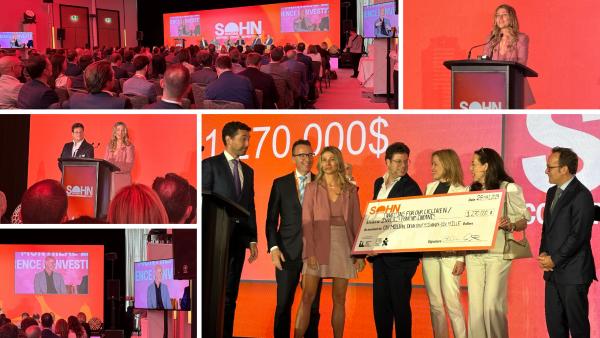Investment Ideas, Global Insights, and a Cause Close to Home
Reflection from the Sohn Conference
On May 28, the Four Seasons Hotel in Montreal hosted a notable gathering of investment minds from across North America. The inaugural Sohn Montreal Investment Conference brought together a global network of hedge fund managers, institutional allocators, family offices, and macro strategists for a full day of investment ideas, honest debate, and shared purpose.
Richter, Business |Family Office was proud to serve as a presenting sponsor for this first Canadian edition of the Sohn Conference. Originally founded in New York in 1995 to honour the memory of Wall Street professional Ira Sohn, the conference has grown into a globally respected investment forum, with events now held in notable locations such as London, Hong Kong, Sydney—and now, Montreal.
While the conference is best known for surfacing high-conviction investment ideas, its roots are philanthropic. This year’s event raised more than $1 million in support of two local institutions close to the hearts of many in the Montreal community: the Montreal Children’s Hospital Foundation and the CHU Sainte-Justine Foundation. We’re also proud that Anik Lanthier, our Partner and CIO, co-chaired the organizing committee that helped bring this world-class event to life.

As expected, the speaker lineup reflected the depth and diversity that Sohn is known for. Among the presenters at the event were:
- David Einhorn – Greenlight Capital
- Gavin Baker – Atreides Management
- Nancy Zimmerman – Bracebridge Capital
- Nicole Musicco – former CIO of CalPERS
- Matt Botein – Gallatin Point Capital
- Suzy Gibbons – Kempner Capital
- Mark Lasry – Avenue Capital
Their coverage spanned public and private markets, credit, macro, biotech, and alternatives. While each presenter was tasked with sharing a specific investment thesis, some clear themes emerged – ideas that extended well beyond any single trade. In the end, five themes really stood out:
Navigating a Fragmented World Requires Precision
Multiple speakers spoke to the fading coordination of global policy and the rise of divergent fiscal regimes, particularly in the wake of increased volatility south of the border. With more of the political narrative influencing capital markets (which may be more difficult to predict than economic factors) regional risk factors and macro dislocations are likely to become more significant. While this raises the bar on portfolio construction to ensure proper diversification, it also opens the door to more targeted opportunities where active decision-making can add value.
The Case for Rebalancing Beyond the U.S.
Concerns over U.S. fiscal policy, political instability, and market saturation prompted a number of presenters to look elsewhere – particularly toward Europe. Speakers noted that European equities and credit can offer attractive valuations, more grounded fundamentals, and less institutional crowding, which may suggest a timely reappraisal of global allocations. While there was no outright recommendation to avoid the US, some speakers suggested that for the first time in many years there seem to be unique opportunities to be had in the European market worth rotating capital out of the US for. And given the relative valuation gap between the highly priced US market and the relatively cheap European market, the risk/return profile looks broadly more compelling on the other side of the pond.
Rethinking the 60/40 Portfolio
One speaker offered a stark reminder: in crisis periods, traditional diversifiers like bonds can become correlated with equities, as we saw in 2022 when both bond and equity prices moved in tandem as investors feared the implications of increased fiscal spending on deficits and bond yields. They argued that we face a similar environment today with the prospect of ballooning budget deficits driving up US Treasury yields and putting pressure on the US dollar. The speaker noted that this backdrop reinforces the need for broader portfolio construction outside of the traditional stock/bond model. In short, in today’s uncertain environment, uncorrelated strategies, real assets, and alternative sources of return are as important as ever.
Dislocation Breeds Alpha
In sectors as varied as Japanese retail, European credit, and early-stage biotech, managers are finding value where others aren’t looking. These are not the momentum trades that have underpinned the rise of the magnificent seven. These are unique, idiosyncratic opportunities that require deep due diligence, operational insight, and often a hands-on approach. With this in mind, several speakers emphasized the growing value of bottom-up stock selection, particularly in markets distorted by passive flows and short-termism. Whereas the last 18-24 months have been characterized by broad momentum factors that have challenged the skills of active managers, geographic and economic divergence has become an increasingly supportive backdrop for active stock pickers.
Secular Growth Themes with Staying Power
Outsized wealth creation often comes from being an early investor in developing themes that over time become secular in nature. And while the traditional tech trade may look a bit extended at the moment, many speakers identified emerging themes as potentially having longer term staying power. From certain bullish views on AI memory infrastructure, to the rise of sports as a resilient asset class, to breakthroughs in cancer therapeutics, the conference highlighted a number of themes with multi-decade potentials. These ideas remind us that while markets may be turbulent, innovation remains a powerful investment driver and that there are investment managers out there who are working hard to try and unearth these opportunities.
Conferences like Sohn don’t offer answers so much as they offer perspective. What stood out this year wasn’t just the diversity of ideas, but the shared acknowledgement that we’re in a more fragmented, less predictable world where the assumptions that have held up over the last decade may not hold going forward.
We don’t view these sessions as a source of ready-made solutions, but as a chance to listen, reflect, and challenge our own thinking. They help us stay connected to the broader investment dialogue and ensure we’re asking the right questions on behalf of the families we work with. If any of the themes discussed above resonate, or if you’d like to explore how we’re reflecting them in your portfolio, we welcome the conversation.






